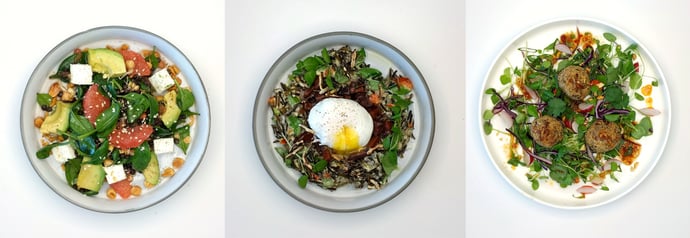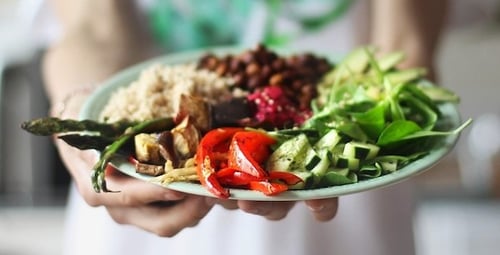Future 50 Foods: Transforming Your Workplace for a Healthier Planet
They say variety is the spice of life. However, when it comes to the food we grow, produce, transport and eat, it could prove to be much, much more.
Today, the selection of foods that feed daily diets is limited—75% originates from just twelve plant and five animal species. This widespread dietary monotony doesn’t provide enough vitamins and minerals, which can lead to health problems. More importantly, our dependence on a narrow range of agricultural products increases the vulnerability of our food system, which is already under threat from climate change. In particular, our over-reliance on animal-based foods has an enormous impact on greenhouse gas emissions.
Knorr Professional and leading conservation organization WWF’s Future 50 Foods initiative sets out to tackle these pressing issues and contribute to large scale change. The Future 50 Foods are crucial to a sustainable food system that protects the planet and promotes human health, and they also offer exciting opportunities for culinary experimentation. Sodexo has partnered with Knorr and WWF-UK to bring Future 50 into the workplace, transform existing services and help our clients reinforce their commitment to the corporate responsibility roadmap.
Did you know? The Future 50 Foods can be grouped into 11 categories:
- 9 Beans
- 9 Cereals & Grains
- 9 Leafy Greens
- 4 Nuts and Seeds
- 4 Tubers
- 3 Fruit Vegetables
- 3 Root Vegetables
- 3 Sprouts
- 3 Mushrooms
- 2 Algae
- 1 Cacti
Businesses ready to make a difference can embrace Future 50 and adapt their onsite food services to promote diverse and sustainable diets and employee satisfaction. Change can also extend beyond the workplace, with employees influencing the behaviors of the people in the cultures and communities they live in.
The Impact of a Limited Food System
Eating too much of the same foods is not good for our health or the health of our planet. From a dietary perspective, current practices exclude many valuable sources of nutrition. According to the World Health Organization, 2 billion people suffer from micronutrient deficiencies, which is partly due to our limited diets.
Over-reliance on a small range of crops can also have serious repercussions on the food supply. Growing the same crop on a piece of land instead of rotating in others make them more prone to diseases and pests, and is not good for the soil.
Furthermore, our over-dependence on animal-based foods has an enormous impact on climate change. The World Resources Institute shows that global agriculture and land-use accounts for at least a quarter of all greenhouse emissions, with resource intensive products such as meat and dairy among the biggest polluters.
As a first step toward a global food system that reinvigorates agrobiodiversity, the Future 50 Foods Report identifies under-utilized plant-based foods that optimize nutrient density, reduce environmental impact and unlock variety for the global population. For leaders, it offers a clear path to participate in change, promote health and sustainability from within the business, and demonstrate the benefits of variety to the wider community.
"Most of us might believe it’s our energy or transport choices that cause the most serious environmental damage."
The Appetite for Change
Employees have become allies in the movement toward this food future. As consumers, they are already making conscious choices with the aim to drive positive impact, both in their own lives and for the good of the planet, while influencing those around them to do the same. Three trends in particular are driving this appetite for change:
Trend #1: Growing Taste for Authentic and International Foods
Creative consumer brand options have opened up a world of new tastes. People are now more likely to experiment with global flavors and less willing to restrict their diets. Sodexo’s Modern Workplace Dining Survey found that 87% of employees want their onsite cafe to offer a range of different foods throughout the day.
Trend #2: Sustainability and Plant-Forward Attitudes
Nielsen’s The Evolution of the Sustainability Mindset report finds growing support for green and ethical foods. More than 4 out of 5 global consumers feel strongly that companies should help to improve the environment, while GlobalData reports that 70% of people are either reducing meat consumption or adopting a fully plant-based diet.
Trend #3: Health as a Personal Priority
Healthy eating is also increasingly on consumer’s agendas, with younger generations leading the way. Sodexo’s Global Workplace Study revealed that 72% of employees consider healthy and energizing food a key priority when it comes to their workplace experience. People want greater access to simple, clean, nourishing ingredients.
"73% of global consumers say they would definitely change their consumption habits to reduce their environmental impact."
For businesses who provide the snacks and meals that fuel their employees’ days, there is a fresh urgency to create offerings that meet this modern consumer mindset. Companies that wish to be seen as employers of choice can align with these trends, using diversity as the basis for food sourcing and service strategies in the workplace.
Creating Diverse Menus to Drive Positive Impact
Chefs are uniquely positioned to drive positive change through their menus. It’s why Sodexo challenged its chefs around the world to respond to the launch of Future 50—and the booming plant-based food trend—and use their creativity to develop recipes with new ingredients such as amaranth seeds, the ube (purple sweet potato) and maitake mushrooms.
“The project has been a fantastic way to bring our chefs together and explore exciting new ingredients,” says Lloyd Mann, Sodexo VP Culinary, Global Executive Chef. “We’ve been able to create a range of innovative, interesting, diverse menus designed to improve human health, encourage wildlife prosperity and promote sustainable use of resources.”
“These can give our clients the support they need to drive positive impact and contribute to large scale change,” he says. In fact, companies partnering with Sodexo are already seeing the benefits of Future 50 and the new menus available to them. The initiative brings about an opportunity to create an enhanced workplace food experience that engages staff in positive change.

One of the 40 dishes created by the Sodexo chefs is the nutrient-rich Wild Rice, Quinoa and Lentil Bowl, which includes the following ingredients:
- Kale: A hardy plant grown year-round in temperatures as low as 5°F / -15°C. Packed with vitamins A, K and C, and a good source of manganese and copper.
- Red Sweet Potato: An uncommon variety which has a positive impact on biodiversity, farming yields and soil health. A valuable source of vitamins A, C, E and manganese.
- Wild Rice: The seed of a semi-aquatic grass that grows wild in North American lakes and rivers— contains more protein, zinc and iron than white rice.
- Quinoa: A complete protein that grows in diverse climates and terrains. Gluten-free with an exceptional balance of protein, fat, minerals and vitamins.
- Lentils: Require little water to grow and have a carbon footprint 43 times lower than that of beef. Loaded with protein, fiber and carbohydrates.
- Sesame Seeds: Versatile seeds with many uses, they are highly resilient and considered an excellent source of copper and magnesium.
- Amaranth: A seed that can be grown at any elevation without needing much water. Compared to other grains, amaranth is high in magnesium and protein.
The Future of Food
Although the Future 50 Foods Report reveals challenges in the outlook for the global food system, opportunities are revealed as well. Today, Sodexo is partnering with Knorr and WWF-UK to help to redefine this global system through the diversification of food production.
"The Future 50 Foods initiative aims to increase the intake of these sustainable and nutritious foods to help improve the health of people and the planet."
Through the Future 50 initiative, Sodexo is already helping organizations to rethink their approach to workplace food. In doing so, we’re helping businesses large and small to meet their corporate responsibility commitments and enhance company reputation, while promoting widespread health and sustainability throughout the global community.
Future 50 is the beginning of that journey, a flavor-packed vision for tomorrow’s food system.
Learn more about Sodexo’s partnership with Knorr and WWF-UK.
Contact us to learn more about our food services for Business & Industry.
